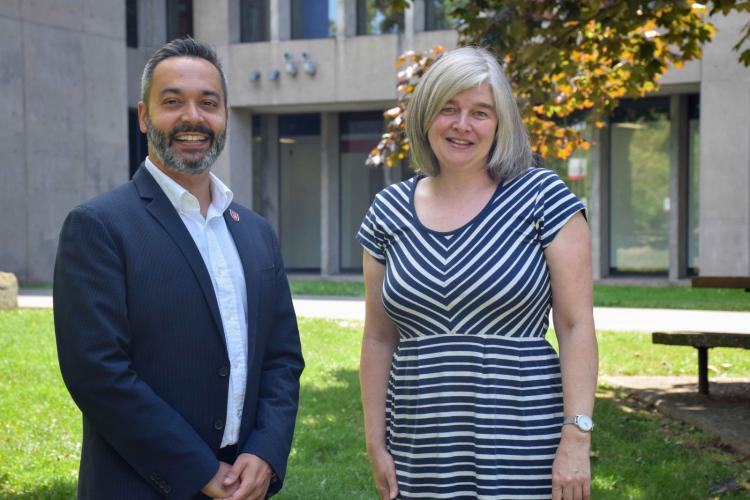New Brock research and initiatives are helping to ensure educational technology enhances the student experience rather than creating barriers or widening inequities.
The University's recently released Ethical Framework for Educational Technologies is designed to guide faculty and staff as they procure, develop and deploy digital tools to facilitate learning.

Karen Louise Smith (right), 2025 Chancellor's Chair for Teaching Excellence recipient and Associate Professor in the Department of Communication, Popular Culture and Film, is working alongside Rajiv Jhangiani (left), Vice-Provost, Teaching and Learning, to advance ethical technology practices.
"This cuts to the core of the purpose of higher education: to aid and lead societal transformation, to inform, to educate, to be driven by evidence-based practice and to steer toward a more just future that builds a better world," says Vice-Provost, Teaching and Learning Rajiv Jhangiani, who led the development of the framework.
Drawing from the values prioritized within Brock's Academic Strategic Plan, the framework includes 11 considerations for assigning a technology to students. Examples of these tools include videos, quizzing or homework platforms, and open educational resources.
"There's potential to do real harm with the best of intention and, as a sector, there has been a tendency to be reactive after procuring technologies that are determined to be ableist or that reinforce systemic inequalities and racial biases," Jhangiani says. "Instead of looking only at compliance when we're procuring, deploying or renewing technologies, we need to set a higher standard with these parameters being the floor and not the ceiling of ethical considerations related to these technologies."
Karen Louise Smith, Associate Professor in the Department of Communication, Popular Culture and Film, was recently awarded a 2025 Chancellor's Chair in Teaching Excellence to advance her work on ethical educational technology.
Distributed by the Centre for Pedagogical Innovation, the three-year grants allow chair-holders to undertake projects designed to advance teaching and learning practices.
"Student voices are incredibly important to move towards raising the bar for ethics in institutions," she says.
Another dimension of Smith's project examines what she calls "data frictions," or the tensions between different values as data is processed and used for multiple purposes in an educational setting.
"A technology collecting voice data may be very important for accessibility purposes, but instructors may have concerns about intellectual property rights or the potential to be spoofed or turned into a deep fake," she says. "We need to consider all of these factors when we think about how data is collected and processed. Success, for this kind of research, involves constructively addressing important needs simultaneously."
Smith says consumers and organizations have the power to influence practice and policy by making informed choices about educational technologies, such as those recommended in the ethical framework.
"It's sometimes a choice faculty members make to either introduce students to a commercially provided product or opt for an open-source version," she says. "In my third-year Digital Culture course, for example, I'm making a point to use the Wiki Education platform and introduce students to the open community of Wikipedia in the hopes that, in addition to learning about user experience research, they'll also learn about participatory culture and practice those values in their learning activities."
As well as serving as a faculty resource during the consultation of the framework, Smith also works closely with Jhangiani on related research through Brock's Inclusive Education Research Lab.
Jhangiani says Smith's research highlights how educators can apply the principles of the framework to build a more equitable and respectful teaching, learning and research environment. He also hopes it will inspire other institutions to follow in Brock's footsteps.
"Brock has already made industry-leading decisions in this space, but there's more work that can be done," he says. "Ultimately, it's about trying to raise the bar when it comes to ethics and technology in higher education overall, starting in and then not limited to Niagara."













